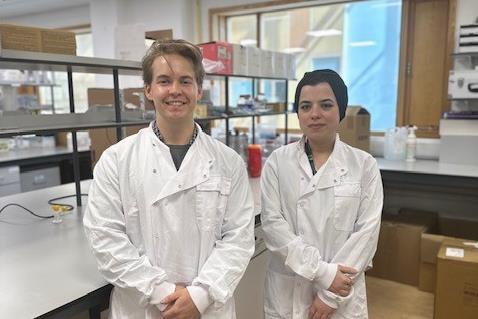Second year medical student Caleb Morin reveals what happened during his Applied Microbiology International-sponsored Summer Placement at the University of Galway investigating wastewater surveillance for monitoring yellow fever virus.
Caleb undertook a project ‘Unlocking Insights: A Systematic Review on the Utility of Wastewater Surveillance for Monitoring Yellow Fever Virus’ while doing his placement at the School of Medicine, University of Galway, with AMI One Health Advisory Group member Dr Zina Alfahl.

“Yellow Fever Virus (YFV) remains a significant public health threat, particularly in tropical areas in South America and Africa. Surveillance of YFV is essential for identifying and controlling outbreaks, but it is complicated by asymptomatic cases and limited resources,” Caleb explained.
At the start of the project, he was enrolled in an online course on systematic reviews and meta- analysis.
“This course provided an excellent outline and introduction to my project on YFV and wastewater surveillance. Furthermore, this course provided me with an excellent foundation in systematic review and meta-analysis methodology which I used in the project. I also received laboratory training which expanded my wet-lab skills, again important for future endeavours,” he said.
Wastewater surveillance
“The purpose of this review was to examine feasibility and limitations of wastewater surveillance for the surveillance of YFV and other arboviruses, focusing on concentration and extraction methodology, viral decay kinetics and quantification techniques.”
Next, Caleb conducted a literature search across five databases: PubMed, Science Direct, Web of Science, Embase and Google Scholar following the PRISMA guidelines.
He is currently preparing a manuscript which will be submitted to the Journal of Applied Microbiology, an Applied MIcrobiology International publication.
Similar viruses
“Overall, YFV was not detected in population-based wastewater samples; however, successful detection of similar viruses like Dengue virus, Zika virus and Japanese encephalitis virus suggest potential for YFV monitoring with wastewater surveillance,” he said.
Furthermore, YFV-spiked wastewater studies revealed similar concentration efficiency and decay rates between various arboviruses, further highlighting the ability of non-YFV arbovirus studies to inform YFV monitoring strategies. Effective concentration methods for YFV from wastewater likely include centrifugation ultrafiltration and solid pellet extraction, though several others may be effective.
“YFV and arboviral decay kinetic studies indicate that despite faster decay at higher temperatures typical of tropical climates, YFV remains detectable for several days at these temperatures. Advanced quantification methodologies like next generation sequencing (NGS) and digital polymerase chain reaction (PCR) may also be important for enhancing the sensitivity and specificity of YFV and arboviral surveillance in wastewater. Ultimately, wastewater surveillance holds promise for monitoring YFV and other arboviruses, though more research is needed to overcome inherent limitations.”
Aspects of virology
Caleb said that throughout the project, he learned a tremendous amount about YFV and arbovirus kinetics, transmission, epidemiology, shedding, surveillance and vaccination.
“All these aspects of virology are directly applicable to my current medical degree and are surely foundational to my future career as a physician. This project has further solidified my interest in virology and has caused me to strongly consider a future specialization in infectious diseases,” he said.
“Furthermore, I have gained a sizable knowledge surrounding virus epidemiology, wastewater surveillance of many pathogens, and arboviral control strategies, including case tracing, vector control methods and vaccination.
Knowledge and skills
“In addition to the sheer knowledge gained this summer, my project has also helped teach me with the skills necessary to synthesize, analyse, appraise and apply research.
“Additionally, I gained experience in navigating databases, creating a research question, registering review protocols and building a search strategy. Regardless of specialization, these skills will be applicable to my future career in medicine where I will be making research-informed decisions.”
Dr Alfahl said she was extremely proud of Caleb’s dedication and the significant progress he made throughout the project.
”Caleb’s investigation into the feasibility of wastewater surveillance for Yellow Fever Virus (YFV) monitoring was both ambitious and highly relevant, especially in the context of global health challenges. His systematic approach, from the literature review to the application of advanced methodologies, demonstrated his keen analytical skills and ability to tackle complex public health issues,” she said.
Intellectual curiosity
”Caleb not only honed his technical abilities, including wet-lab techniques and systematic review methodology, but also displayed impressive intellectual curiosity. His enthusiasm for microbiology shows great promise for his future career. Watching Caleb develop both as a researcher and a critical thinker was a rewarding experience, and I am confident that his contributions will have a lasting impact in the field of infectious disease monitoring.
”I would also like to extend a sincere thank you to Applied Microbiology International for funding Caleb’s summer studentship. Their support was instrumental in providing him with this invaluable opportunity to develop his research skills and contribute to a project with important public health implications.”







No comments yet